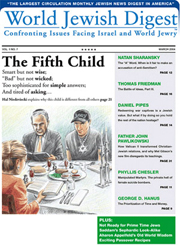SINS OF THE FATHER:
Coming-of-Age Story Derides Jewish Dad
Jan’s Thoughts on
MONSIEUR IBRAHIM

MONSIEUR IBRAHIM, a 2003 French film opening in American art houses this month, is described by its promoters as the story of a life-affirming friendship between a Jewish boy and a Muslim man. While this description is technically true, Jewish audiences looking for Jewish content in the film will leave the theater vacillating between disappointment and rage.
The protagonist, Moise (Moses), has a Jewish name but no evidence of a Jewish life. He lives alone with his father in a small flat in Paris. We never see Moise go to either school or synagogue, but we watch him make multiple trips to a small local grocery store. Over time the proprietor, who is known in the neighborhood as “the Arab” even though he’s actually from Turkey, becomes the boy’s surrogate father.
But what about Moise’s real father, his Jewish father? The film gives this man no name, no history, and no concrete daily life. When he comes home from work at night, he eats and then retreats to an armchair surrounded by books.
The film is set in the early 60s and Moise is a teenager, so it doesn’t take a math genius to figure out that Moise was born right after the Holocaust. Does that make the father a survivor? The film offers no clue. But in one scene Monsieur Ibrahim coaches Moise: You can save money if you buy cat food and tell your father it’s pate. The father eats the “pate” without comment. Maybe the general audience can enjoy this ruse, but the Jewish viewer wonders why Moise’s father doesn’t notice. Where has this man been and what has he been forced to eat in the past?
Invoking the Holocaust would not “excuse” the father’s detachment from his son, but it might humanize him. (In his masterpiece MAUS, Art Spiegelman depicted his exasperating father with both honesty and tenderness.) As it is, the film gives Moise a choice between two father-figures. One is a cold, remote, penny-pinching Jew, and the other is a warm, supportive, generous Moslem. With a deck this stacked, the ending is obvious. Moise is destined not only to inherit the store, but to become the new neighborhood “Arab.”

If we ignore any suggested implications for the Arab/Israeli conflict and just go with the flow,
MONSIEUR IBRAHIM is an endearing little coming-of-age piece. Like most adolescent boys Moise is obsessed with sex, so he eagerly spends the money he saves in the grocery store on street-corner prostitutes. (In the Paris of memory, they are all kind and beautiful). Monsieur Ibrahim watches Moise arrange these liaisons with a nostalgic beneficence that saves the story from possible misinterpretation. Sensing his vicarious pleasure, we don’t have to ask why an elderly man with no visible relations is taking such intense interest in this handsome boy. Omar Sharif, who just won a Cesar Award for this role, plays Monsieur Ibrahim with such grace, humor, and charm that we can only envy Moise his good fortune.
Unfortunately, however, the film’s subtle anti-Jewish attitude, masquerading as cultural openness, may make its genuine charms difficult to enjoy.
© Jan Lisa Huttner (3/9/04)
FF2 NOTE:
This article is a slightly expanded version
of the review originally published
in the March 2004 edition of the
WORLD JEWISH DIGEST
(Volume 1 Number 7)
& is posted here with their permission.
For WJD subscription information:
Call 312.332.4172 extension 42
or
Fax 312.332.2119

